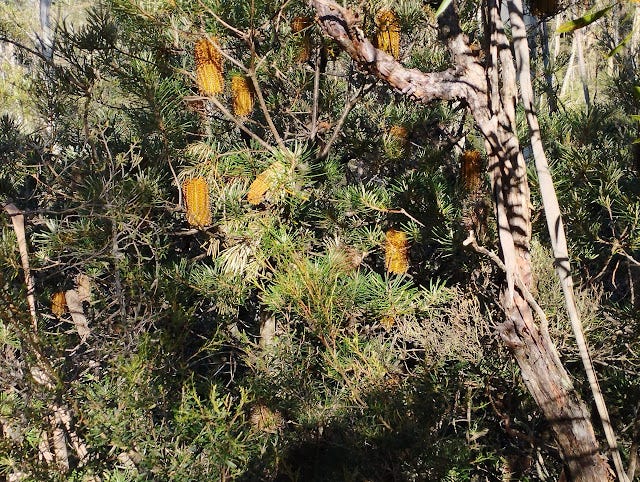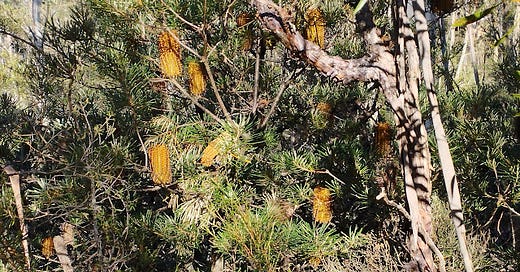
Drenched, that was it. Hard to make sense of any of it.
There was outrage in the area over the Labor government's intention to destroy the amenities of the South Coast with windfarms, diabolically ugly, expensive and environmentally ruinous.
Nothing could hold this government in check, a pack of morons run by bureaucrats who had been allowed to run out of control, to build their complex webs, their absurd layers of institutional dysfunction, since one gormless Prime Minister after another allowed the Australian public service to spin out of control unchecked.
The pimples on the dog turd pile, the politicians, just went along. It wasn't their money. They deeply didn't care. $100 million to Vietnam for climate change, a country wealthier, more cohesive, more productive and far more successful than Australia. No doubt someone would pocket the money for some useless program.
Decades this had been going on, academics and bureaucrats blathering about climate change, while the Great Believer, Laugh Out Loud, Bill Gates, laughed all the way to his groaning bank vault. Evil is as evil does. They truly didn't care; they had had just spotted a way to terrify and control the public while making bucket loads of cash. That anyone still believed their dosh was beyond comprehension.
$100 million for the World Health Organisation, funded to the tune of billions by Bill Gates and the Chinese, raked off the back of Australians struggling to pay their mortgages, with more and more people facing genuine homeless.
There was nothing genuine, or sincere, about this rotting edifice called a government.
The woke were becoming unwoke, faced with the reality of their own lives and the rampant destruction of the society and, well, the backlash. This government was just as dysfunctional, arguably worse, than its predecessors. All the good will that Prime Minster "Albo", Anthony Albanese, brought to office had dissipated.
He shows up to parliament drunk, people whispered, as a way of explaining his slurred words, his poor vocabulary, his geriatric hold on the old style of politics, confrontational, petty, benignly stupid as the country slipped and dived into a terrible, crimpled state.
He pondered the remarkable beauty of a disposable world.
A species, human. Like a stellar nursery, just another evolution of intelligence to imprint upon the Gnostic Gods, the universal spirit, the internet of everything, the ancient evolutions.
"We are the ancients," they sometimes whispered, but now the Watchers on the Watch had backed off, the hysteria, the confusion of voices, the things that drove him to try and block out all consciousness.
He was over it now.
"I'm not going to live in silence, I'm not going to live in fear," went the song, which he had varied in preceding days, "I'm not going to live in darkness, I'm not going to live in fear."
It was an adjustment, this greater mood, this happiness, in some terrible sense.
"The glass is either half full or half empty," he declared at this morning cafe. "And this ones brimming over."
At least it was a step in the right direction; a way to overcome. This brief interlude. This brief life. This short lived species; while out there the infinite brooded in ancient forests and Ishtar, that cruel god of love and war, whispered by.
And the ancients cried: Beware. This is dangerous ground.
AUSTRALIAN MAINSTREAM NEWS SITES
SKY
The Australian government has pledged $100 million in foreign aid to the World Health Organisation (WHO) in a bid to bolster management of pandemics on a global scale.
Foreign Affairs Minister Penny Wong announced the funding package on the second day of the high-level UN General Assembly, following a convention debate in the area of Pandemic Prevention, Preparedness, and Response (PPPR).
The government said it would provide $75 million in voluntary core funding over five years to the WHO and a further $25 million for the WHO’s Health Emergencies Programme.
“COVID-19 demonstrated that global challenges require collective action,” Minister Wong said in a statement.
“Our commitment to the WHO will support activities to mitigate the risk of future pandemics, including strengthening national health systems and responding to disease outbreaks.”
The Department of Foreign Affairs and Trade will also work in collaboration with the WHO and its partners to support coordinated responses to other emerging diseases threats in the Indo-Pacific and ensure the global health system meets the region’s needs.
Ms Wong said this cohesive approach will help Australia “be better prepared for future shocks”.
“We need a strong global health system to help keep Australia, our region, and the world safe. This means a strong, capable WHO with the authority to respond quickly and decisively to complex health emergencies,” she said.
The commitment comes a day ahead of Prime Minister Anthony Albanese’s long-awaited announcement of a 12-month COVID inquiry into Australia’s response to the pandemic since its onset.
Australian public deserve better than a ‘watered down’ COVID inquiry
5 hours ago
Sky News Digital Editor Jack Houghton says the Australian public deserves better than a “watered down” inquiry into the handling of the COVID pandemic.
The Albanese government has received criticism after Labor announced an inquiry to look at the federal response to the COVID pandemic but would exclude controversial decisions from state premiers.
“It was such a strange decision to rule out that specific area of investigation out of scope that we actually had widespread agreement in the media,” Mr Houghton said.
“Now, Albanese did leave himself some wiggle room to not call a royal commission, but in my opinion, he should have been far clearer.
“The Australian people deserve better than a watered-down inquiry, and while this may not be a clear and direct broken promise, I’m not sure voters will see it that way.”
ABC
Qantas' new CEO has issued a public apology for a series of scandals that have damaged the airline's reputation, acknowledging it has been "hard to deal with" and promising to make changes to rebuild customer trust.
Key points:
New CEO Vanessa Hudson says the airline has let people down
Ms Hudson announced a number of measures to try and "fix" the airline's issues
She said it had been a "humbling period" for the airline
Vanessa Hudson took over the top job earlier this month after former CEO Alan Joyce stood down following 15 years as one of the country's highest-paid executives.
In a video message released on Friday, Ms Hudson apologised to customers for the airline's recent performance.
"I know that we have let you down in many ways and for that, I am sorry," she said.
"We haven't delivered the way we should have. And we've often been hard to deal with.
"We understand why you're frustrated and why some of you have lost trust in us."
The airline's leadership has been under pressure for weeks following a series of scandals.
GUARDIAN AUSTRALIA
Katherine Murphy
At one point during the week I asked an old political friend whether or not they intended to join the fray on a particular issue. My mate replied quickly and succinctly: the fray is the problem.
This observation is bang on, and fraying is the right concept. Fraying is the unravelling that occurs through constant abrading. That’s where we are. Australian politics has reverted to friction; to manufactured conflict. Conflict is the core of Peter Dutton’s strategy to blast himself into contention. The Liberal leader is like a bouncer on a bender, and the great unravelling of Anthony Albanese is what he seeks.
It’s all brute force. Politics is supposed to be a battle of ideas, but Dutton has styled himself as a one-man insurgency against them. The Liberal party’s catchphrase in the referendum (“if you don’t know, vote no”) is a prompt to disengage your brain; it’s permission to tune out and make decisions on the vibe of the thing. Having determined that constant contention would be the vibe of the voice referendum, Dutton vastly increased the chances that voters will do as he suggests and tune out from the percussive negativity.
SPECTATOR AUSTRALIA
As this magazine pointed out last week, there is no room for complacency in the fight to defeat the referendum for an indigenous Voice to parliament. It is still possible for the No campaign to snatch defeat from the jaws of positive opinion polls. And as this magazine has also pointed out on several occasions, ‘No means no’. Nothing more and nothing less.
In this referendum, No means no to two specific things: ‘No to a race-based change to our constitution’ and ‘No to an unelected indigenous bureaucracy with unspecified legal powers’. That’s it.
No does not mean, and should never mean: ‘If you vote No, you’ll get a second referendum anyway’, to paraphrase opposition leader Peter Dutton. Nor should No mean: ‘If you vote No, you’ll still get a treaty, in fact you’ll get a whole bunch of treaties, and we’ll throw in a change to the date of Australia Day as well,’ to paraphrase No campaigner Nyunggai Warren Mundine. Both those propositions, sadly, can only be described as own goals in this hard-fought campaign.
Peter Dutton was clearly bamboozled by backroom strategists (of the bedwetting variety) still fantasising that they can win Teal seats by moving the party ever-leftwards.
THE NEW DAILY
Alan Kohler: Gulf between housing construction and immigration just gets wider
In the year to March, Australia’s population increased by 563,200 and 171,721 houses and apartments were built.
The population growth consisted of net overseas migration of 454,400 and a natural increase of 108,900 (301,000 births minus 192,400 deaths).
The trouble with using births in the context of housing, it seems to me, is that they’re all babies, and don’t need places of their own yet. A better idea might be to use births in the year to March 2000, because they’re probably leaving home now and therefore adding to this year’s demand for housing.
In that year there were 250,700 births. Also, a lot of deaths don’t actually free up a house because someone is left behind in the same house. So – subtract half the deaths?
Therefore a better number for the impact on housing of births and deaths in the year to March might be about 200,000 – births 23 years ago, minus half of last year’s deaths. Although let’s face it, that’s a pure guess.
If that’s right, a net 654,400 extra bodies were looking for a place to live in Australia in the year to March (200,000 plus 454,400). Let’s round it down to 600,000, since my births and deaths calculation is pretty rubbery.
The average number of people per house in Australia is 2.4. Using that ratio those people need 250,000 places to live.
So the total dwelling completions of 171,721 houses and units represents a shortfall of close to 80,000.
Getting worse
But it’s getting worse. Net migration in the March quarter, the most recent for which data is available (it apparently takes six months to work it out) was 152,200. Add the 50,000 or so people born in the same quarter 25 years ago and who are now leaving home or getting married, subtract half the deaths, and divide by 2.4, and housing demand in that quarter would have been about 80,000.
Yet housing completions actually fell to 38,175, a quarterly shortfall of more than 40,000. If those March quarter numbers for demand and supply kept up for 12 months, the national housing shortfall for the year would be about 160,000.



